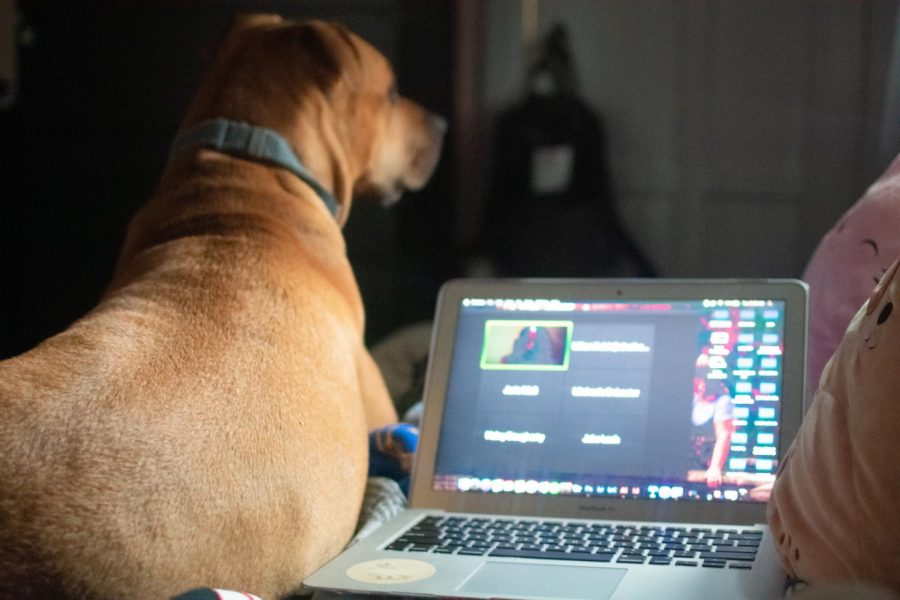Home and school: the lessening gap between sectors of our lives
Lilly Kubit’s personal setup during the two week at-home class sessions in December, featuring her dog and laptop. Photo by Lilly Kubit
March 6, 2021
While technological advancement is highly regarded as good, there is always some bad that comes with everything. Ask anyone old enough to remember a time before the internet and they may tell you that, surprisingly, work and home were quite separate in the pre-internet age. While this gap between work and home has been shrinking since the dawn of this new technological age, the stay-at-home orders put in place due to the COVID-19 pandemic have sped up this process, further bringing work into everyone’s homes.
With a simple Google search, one can see that the work and life balance is a struggle for many people. Resources galore, from Mayo Clinic to Forbes.com, strive to give tips to those dealing with having work and home so close-knit, especially during a pandemic.
Schools have suffered the same fate, even at Chatham. Classes that were once held in buildings across campus such as Falk, Coolidge, Buhl and the Art and Design Center are largely moved to an online format, with lectures being held on Zoom or replaced by asynchronous lessons uploaded to Brightspace.
Students can now easily roll out of bed and press a few buttons while still making it to class on time. Many students are trying their best to remain positive despite these unique circumstances, like Sierra Sokol, ‘23.
“Personally doing school from my living space has been nice for me since I can be comfortable and when class is over I don’t have to travel. Also, sometimes I think it’s easier since I can work on homework right after class,” said Sokol
Phillip Hingston, ‘24, also sees some positives from online schooling. For him, being a first-year in college can be nerve-racking, and online school may help to alleviate some of those worries.
“My dorm room desk has become my classroom and it’s in a way comforting to have a computer screen between me and my teacher. It made the awkward first day of school jitters disappear,” said Hingston.
Online school has also allowed for students to take classes they possibly couldn’t fit into their schedules otherwise.
Asynchronous classes allow for work to be done relatively at a student’s leisure, and worries regarding transportation are less of an issue, especially for commuter students. In person classes also have a backup plan when issues such as power outages, storms, or other complications arise that would normally cancel class.
“I feel as though because of the pandemic there has been a lot of innovation with doing everything online, so I think that after the pandemic is over there will be changes to school and class structure allowing for more online work, as well as the formation of more online classes in college,” said Sokol.
Despite the leaps in technological advancements made because of the pandemic, there are still benefits to being in person, according to Hingston.
“Teachers can only do so much over the web when it comes to solving in class issues such as proctorio problems… but that’s bound to happen when a new system of learning is being built from the ground up,” said Hingston.
Patience is key when living in such a shifting system that is the current education system, but for many students this can be tough, especially for a student mentally. The effect of the shrinking gap between school and home life on mental health has been clear for Hingston.
“Honestly, I need a new way to approach school from my house. I’ve seen the lack of leaving my dorm taking a bit of a toll on my mental health, as my dorm is a place I go to when I want to be in my own space. Now my ‘safe space’ in a way is being used to interact with a lot of people and it’s not the most ideal. However if this means i’m being safer during a public health crisis I’ll take it.”
Overall, the shift in how we learn and live has had both positives and negatives for all of us. If you or someone you know is struggling with school-life balance, Pulse @ ChathamU features a blog post about this topic, and further help can be found through Chatham Counseling Services.







